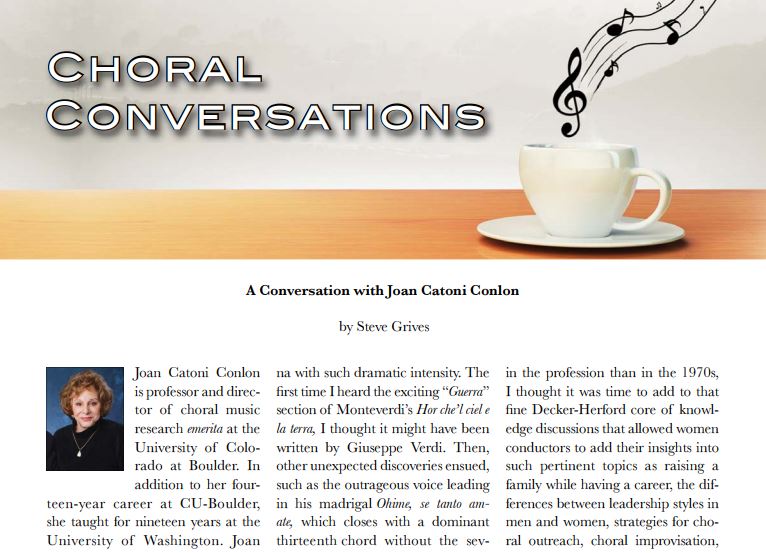
_____________________________
Choral Journal’s ongoing column called Choral Conversations” features interviews with noted choral conductors and composers. The first interview in this series took place with Joan Catoni Conlon in the February 2016 issue. You can read it in its entirety online at acda.org/choraljournal. Click “Search Archives” and choose February 2016 from the dropdown menu.
_____________________________
What inspired you toward your main areas of interest, Claudio Monteverdi and women choral conductors?
My first encounter with the Italian language outside of my home was in the poetry in Renaissance Italian madrigals, and it was just like discovering a beautiful new world of expression. After that, Monteverdi further fascinated me when I realized that he broke the rules of counterpoint perfected by Palestrina with such dramatic intensity. The first time I heard the exciting “Guerra” section of Monteverdi’s Hor che’l ciel e la terra, I thought it might have been written by Giuseppe Verdi. Then, other unexpected discoveries ensued, such as the outrageous voice leading in his madrigal Ohime, se tanto amate, which closes with a dominant thirteenth chord without the seventh. Of course, his word painting is simply over the top: the love madrigal Si, ch’io vorrei morire employs pitch clusters and notes rubbing against each other in major and minor seconds to convey physical proximity. I was surprised by how modern he was.
With regard to the book Wisdom, Wit and Will: Women Choral Conductors On Their Art, I thought it was time to add to the core of choral texts a set of essays written by some of my excellent women colleagues, many of whom were unpublished. In the 1970s, the core text revered by graduate students was the Harold Decker Julius Herford Choral Symposium, a wonderfully broad and intelligent assemblage of essays about such topics as conducting, analysis, editing, and choral styles. All the authors were men, of course, and we all read it. Since there now are more women in the profession than in the 1970s, I thought it was time to add to that fine Decker-Herford core of knowledge discussions that allowed women conductors to add their insights into such pertinent topics as raising a family while having a career, the differences between leadership styles in men and women, strategies for choral outreach, choral improvisation, a comparison of salaries earned by men and women in the profession, or misogyny in texts that, for some strange reason, we happily sing and program. Interestingly, despite containing chapters on such non-gendered issues such as conducting by Ann Howard Jones and Beverly Taylor, people think Wisdom, Wit and Will is to be read only by women, because the authors all are women. We never assumed that Decker-Herford was to be read only by men, even though the authors all were men. In fact, Wisdom, Wit and Will is written by women for ALL readers.
What’s the most significant live performance you’ve conducted in your career? I’ll always remember singing Les Noces with you at CU, and have to admit, I was a little disappointed to miss the St. Matthew Passion several years after I graduated.
I think conducting and getting to know Bach’s St. Matthew Passion was a life-changing experience.
Looking back over your career in higher education is there anything you’ve left undone? Something you wish you could have devoted some more time to?
Yes, I wish I had been able to write an ACDA monograph on the vocal music of Heinrich Schütz. And Gesualdo. Somebody should.
_____________________________
Read the rest of this article (and more!) in the February 2016 issue of Choral Journal, available online at acda.org.


Leave a Reply
You must be logged in to post a comment.